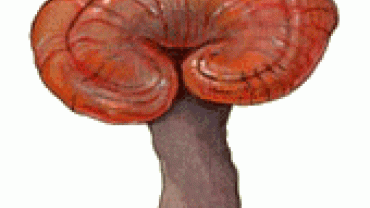
One class of medicinally oriented botanicals I find incredibly interesting is the medicinal mushrooms. While mostly famous and ubiquitous in Japanese and Chinese healing traditions the power of these mushrooms is being studied in western medicine for a vast number of therapeutic properties.
Possibly the most well known of the medicinal mushrooms is the reishi Ganoderma lucidum or Ling Zhi as it is known in China). Ling Zhi translates to divine plant of longevity but is also known as themushroom of immortality and the mushroom of kings. As reishi has been used in China for over 2000 years the name brings to mind Chinese emperors ancient mountainous forests and dark dank and dusty old herbal apothecaries run by wizened herbal wizards.
In the wild reishi grow on hardwoods such as maple oaks and elms but are now very rare and difficult to find in their natural habitat. Therefore most reishi sold today is cultivated commercially.
Immunoprotective properties
This hard woody bitter and subsequently inedible mushroom contains multiple active ingredients including polysaccharides and triterpenes which are currently primarily being studied for their immune system-enhancing and possible cancer-fighting effects.
Specific polysaccharides known as beta-glucans are thought to stimulate the immune system to fight cancer by what researchers believe to be a variety of mechanisms of action including stimulating the production of T cells NK cells and macrophages to fight the afflicted cells inhibiting the adhesion of cancerous cells to normally functioning endothelial cells.
Men's health
The triterpines found in Ganoderma lucidum extracts also inhibit the 5 alpha-reductase enzyme which converts testosterone to dihydrotestosterone and is upregulated in benign prostatic hyperplasia (BPH). This makes it a possible therapeutic tool for men to help fight against BPH lower urinary tract symptoms and possibly prostate cancer.
Liver support
Reishi has been shown to be liver protective reducing fibrosis and associated liver damage in toxin induced hepatopathologies.
Neuroprotective properties
Additionally reishi extracts have demonstrated neuroprotective properties through its modulation of inflammatory cytokines. For instance in cell studies reishi was shown toprotect dopaminergic neurons whose damage is implicated in the pathogenesis of Parkinson's disease.
Autoimmune support
Reishi has shown efficacy in models of autoimmunity. For example it was shown to decrease the symptoms associated with Sjogren's syndrome a condition where the body's lymphocytes attack salivary glands and which is very difficult to treat. Reishi may also prove to be useful in rheumatoid arthritis another autoimmune condition as it demonstrated analgesic characteristics in patients suffering with this condition.
Protection during cancer therapies
There are many many studies showing reishi's potential as an adjunctive therapeutic tool but it's also been shown to protect normal cells from the ravages of both radiation and chemotherapies making it a strong consideration as a complement to traditional cancer therapies.
by Michael Fuhrman D.C.